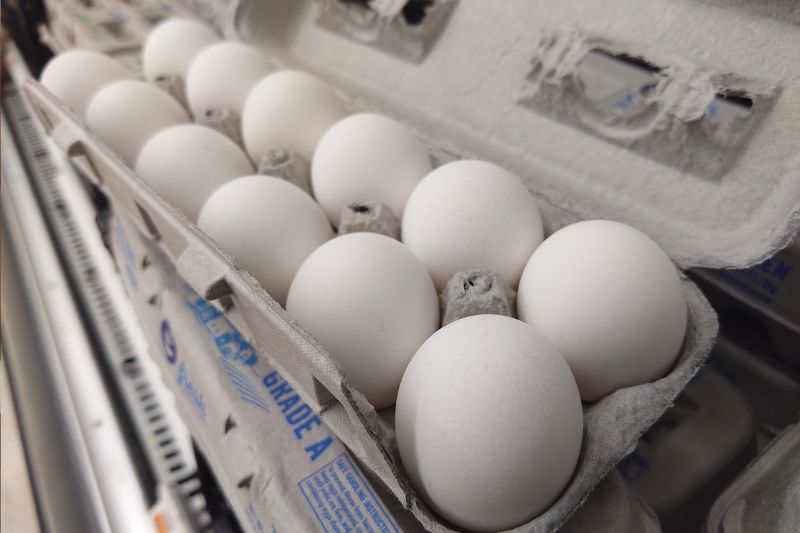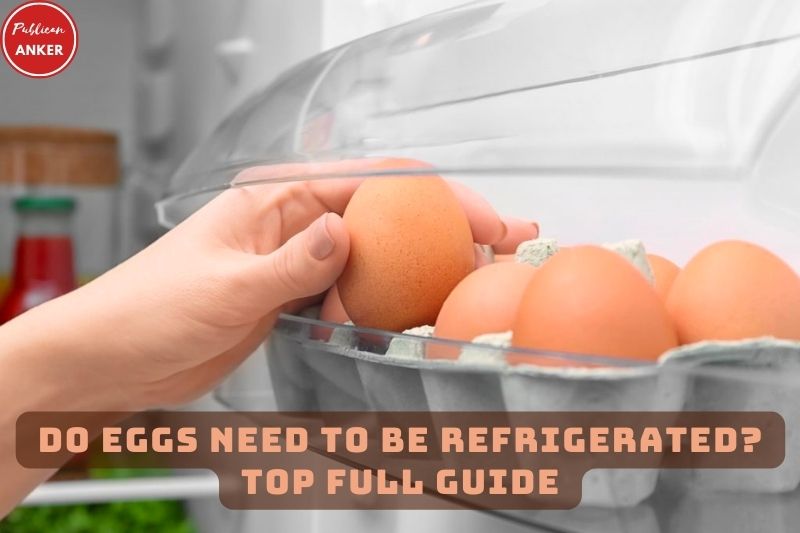A common question that many people have is Do eggs need to be refrigerated? Eggs are a staple food in many households, and it’s important to know how to properly store them to ensure their safety and freshness.
In this article, Publicananker‘ll explore the reasons why should eggs be refrigerated how long they can be stored at room temperature, and tips for proper egg storage. Whether you’re a seasoned home cook or a beginner, this article will provide you with valuable information about the storage and care of eggs.
Do Eggs Need to Be Refrigerated?

In many countries, including the United States, eggs are often sold refrigerated in grocery stores. This is because in these countries, eggs are washed and sanitized before they are packaged, which can remove the natural protective layer on the shell and make them more susceptible to bacteria. As a result, it is recommended to store eggs in the refrigerator to help slow down the growth of bacteria and extend their shelf life.
However, in some countries, there are eggs that don’t need to be refrigerated and can be stored at raw egg room temperature for several weeks. This is because these eggs have not been washed or sanitized and still have the natural protective layer on the shell, which helps to prevent bacteria from growing.
Whether or not eggs need to be refrigerated depends on several factors, including local food safety regulations and the sanitation process used during production. It is always best to follow the storage guidelines indicated on the egg carton or packaging, or check with your local food safety authority for the most accurate and up-to-date information.
How Long Should Eggs Sit Out To Be Room Temperature?

The length of time that eggs can safely sit out at room temperature depends on several factors, including the temperature of the environment and the freshness of the eggs. According to the US Department of Agriculture (USDA), storing eggs at room temperature for more than 2 hours is not recommended. After 2 hours, bacteria can start to grow on the surface of the unrefrigerated eggs and increase the risk of foodborne illness. This is the reason why refrigerate eggs is important.
For best food safety practices, it is recommended to store eggs in the refrigerator at a temperature of 40°F (4°C) or below. When eggs are taken out of the refrigerator to be used, it is important to use them within a reasonable amount of time and not leave them out for an extended period.
If you are concerned about the ideal temperature for storing eggs in a fridge and want to be sure they are safe to use, you can check the ideal temperature for storing eggs using a food thermometer. If the egg storage room temperature is above 40°F (4°C), it is best to discard them and not use them in food preparation.
Eggs should not be left out at room temperature for more than 2 hours and should be stored in the refrigerator to maintain their freshness and reduce the risk of foodborne illness.
How Eggs Can Become Contaminated With Salmonella?

Eggs can become contaminated with Salmonella through contact with infected chicken feces or with the bacteria in the chicken’s reproductive tract. The process typically involves the following steps:
- Chicken colonization: Chickens can become colonized with Salmonella bacteria when they come into contact with contaminated feed, water, or their environment. The bacteria can then colonize the chicken’s digestive tract, and can be shed in their feces.
- Fecal contamination: If chicken feces are not properly removed from the laying environment or nests, eggs can become contaminated with Salmonella bacteria when they come into contact with the feces.
- Shell penetration: In some cases, the bacteria can penetrate the eggshell and contaminate the egg, although this is less common.
- Growth of bacteria: Once the egg is contaminated, the bacteria can multiply and potentially cause foodborne illness if the egg is consumed raw or undercooked.
- Finally, eggs can become contaminated with Salmonella through contact with infected chicken feces or with the bacteria in the chicken’s reproductive tract. Proper sanitation and handling practices, such as keeping chickens in clean and dry environments, regularly checking their health, storing eggs in the refrigerator, and cooking eggs thoroughly, can help minimize the risk of Salmonella contamination in eggs.
Is It Better To Store Eggs In The Fridge In the United States?
In the United States, eggs are often stored in the refrigerator because it is a requirement of the USDA’s food safety guidelines. The USDA recommends that eggs be refrigerated at or below 40°F (4°C) to help slow down the growth of bacteria and extend their shelf life. This is especially important for eggs that have been washed and sanitized, as the washing process can remove the natural protective layer on the shell and make the eggs more susceptible to bacteria.
Storing eggs in a fridge also helps to prevent the growth of harmful bacteria such as Salmonella, which can cause foodborne illness. Consuming contaminated eggs can result in symptoms such as abdominal pain, diarrhea, nausea, and vomiting, and can be particularly dangerous for young children, pregnant women, the elderly, and individuals with weakened immune systems.
Storing eggs in the refrigerator in the United States is a food safety requirement and is necessary to help slow down the growth of bacteria, extend their shelf life, and reduce the risk of foodborne illness.
How To Store Boiled Eggs Properly?

Proper storage of boiled eggs is important to maintain their quality, texture, and flavor, and to prevent the growth of harmful bacteria. Here are some tips on how to store boiled eggs properly:
- Cool eggs quickly: After boiling the eggs, immediately transfer them to a bowl of ice water to cool them down. This will prevent the eggs from over-cooking and will also help to prevent bacteria growth.
- Peel or unpeeled: You can store boiled eggs either peeled or unpeeled, depending on your preference. If you store unpeeled boiled eggs, make sure to place them in a covered container to protect them from air and moisture.
- Store in the refrigerator: Boiled eggs should be stored in the refrigerator at a temperature of 40°F (4°C) or below. This will help to slow down the growth of bacteria and extend the shelf life of the eggs.
- Use within a week: Boiled eggs can be stored in the refrigerator for up to one week. If you are unsure about the freshness of the eggs, it is best to err on the side of caution and use them within a shorter time frame.
- Keep eggs separate: Store boiled eggs in a separate container from raw eggs to prevent cross-contamination and to reduce the risk of foodborne illness.
- Label the container: Label the container with the date of preparation to help keep track of the freshness of the eggs.
In conclusion, proper storage of boiled eggs is important to maintain their quality, texture, and flavor, and to prevent the growth of harmful bacteria. Sustain the boiled eggs refrigeration in the refrigerator, either peeled or unpeeled, and use them within a week. Keep boiled eggs separate from raw eggs, and label the container with the date of preparation to help keep track of their freshness
Peeled hard-boiled eggs
Peeled hard-boiled eggs can be stored in the refrigerator for up to one week if they are properly stored. Here are some tips on how to keep peeled hard-boiled eggs fresh:
- Place the eggs in a covered container: Put the peeled hard-boiled eggs in a covered container, such as a plastic container or a glass container with a lid, to protect them from air and moisture.
- Add a damp paper towel: Place a damp paper towel in the container with the eggs to help keep them moist and prevent them from drying out.
- Store in the refrigerator: Store the container of peeled hard-boiled eggs in the refrigerator at a temperature of 40°F (4°C) or below.
- Use within a week: Peeled hard-boiled eggs can be stored in the refrigerator for up to one week. If you are unsure about the freshness of the eggs, it is best to err on the side of caution and use them within a shorter time frame.
- Label the container: Label the container with the date of preparation to help keep track of the freshness of the eggs.
In conclusion, peeled hard-boiled eggs can be stored in the refrigerator for up to one week if they are properly stored in a covered container with a damp paper towel, and stored at a temperature of 40°F (4°C) or below. Label the container with the date of preparation to help keep track of their freshness.
Why aren’t Eggs Refrigerated in Europe?

In Europe, eggs are not typically refrigerated for a few reasons:
- Different regulations: The European Union (EU) has different food safety regulations compared to the United States. In the EU, eggs are washed and sanitized before they are packaged and sold, which reduces the risk of contamination with harmful bacteria like Salmonella. The EU also has strict regulations regarding the temperature at which eggs are stored and transported, which helps to reduce the risk of bacterial growth.
- Different production practices: Eggs in Europe are often produced and sold differently than in the United States. In Europe, many small-scale farmers produce eggs that are sold directly to consumers at local markets. These eggs are often not refrigerated, but are still considered safe to consume because they are typically consumed within a few days of being laid.
- Different attitudes toward eggs refrigeration: In Europe, there is a different cultural attitude toward eggs and refrigeration, with many people believing that eggs should not be refrigerated because it can affect their flavor and texture. This is why many Europeans choose to store their eggs at room temperature, rather than in the refrigerator.
However, eggs in Europe are not typically refrigerated because of different food safety regulations, production practices, and attitudes toward refrigeration. The EU has strict regulations regarding the temperature at which eggs are stored and transported, and eggs are often washed and sanitized before they are packaged and sold, which reduces the risk of contamination with harmful bacteria like Salmonella.
Pros and Cons Of Refrigeration in Storing Egg
Here is a list of the pros and cons of refrigerating eggs:
Pros
- Reduces the risk of bacterial growth: Refrigeration slows down the growth of bacteria like Salmonella, which can cause foodborne illness.
- Increases shelf life: Eggs can be stored in the refrigerator for several weeks, which increases their shelf life and reduces food waste.
- Maintains quality: Refrigerating eggs can help to maintain their quality, texture, and flavor, which can be affected by high temperatures and changes in humidity.
- Prevents cross-contamination: Storing eggs in the refrigerator can help to prevent cross-contamination with raw meats and other potentially harmful foods.
Cons
- Affects texture: Refrigerating eggs can cause a change in the texture of the yolks, making them less creamy and more crumbly.
- Requires extra space: Storing eggs in the refrigerator can be challenging for those with limited space, as eggs are delicate and can break easily.
- Changes flavor: Some people believe that refrigerating eggs can affect their flavor and make them taste less fresh.
Refrigerating eggs has both pros and cons. It reduces the risk of bacterial growth, increases shelf life, and helps to maintain quality and prevent cross-contamination. However, it can also affect texture, require extra space, and change flavor. Ultimately, the decision to refrigerate eggs depends on individual preferences and needs, as well as local regulations and production practices.
FAQs

Can you keep eggs unrefrigerated?
Yes, you can keep unrefrigerated for a short period of time, usually up to a week or two, depending on various factors such as egg storage temperature and humidity. However, it is generally recommended to store not refrigerating eggs in the refrigerator to ensure their safety and freshness for a longer period of time. If you do choose to store eggs unrefrigerated, it’s important to make sure they are kept at a cool, dry place away from direct sunlight and any strong odors.
Is it better to store eggs in the fridge?
Yes, it is generally better to store eggs in the refrigerator, as it helps to slow down the rate at which they deteriorate and extends their shelf life. Storing eggs in the refrigerator also reduces the risk of contamination from bacteria such as Salmonella, which can be present on the shells of eggs. Additionally, refrigeration helps to prevent the eggs from absorbing odors from other foods in the same area, which can affect their flavor. While eggs can be stored at room temperature for a short period of time, it’s recommended to refrigerate them to ensure their safety and freshness for a longer period of time.
Should you store eggs in fridge or pantry?
It’s generally recommended to store eggs in the refrigerator, rather than the pantry or on the countertop. Storing eggs in the refrigerator helps to slow down the rate at which they deteriorate and extends their shelf life.
How long can hard-boiled eggs last before spoiling?
Hard-boiled eggs can typically last up to one week when properly stored in the refrigerator. It’s important to store them in a covered container to prevent them from absorbing odors from other foods and to reduce the risk of contamination. Additionally, it’s a good practice to mark the container with the date that the eggs were boiled, so you can keep track of how long they have been stored. When in doubt, it’s always best to discard eggs that have been stored for too long or show signs of spoilage such as a foul odor or unusual discoloration.
Do eggs go bad in the refrigerator?
Yes, eggs can go bad even when stored in the refrigerator. Generally, fresh eggs can last for up to 5-6 weeks in the refrigerator, but it’s always best to check the expiration date on the carton or to perform a simple float test to determine if an egg is still fresh. If you notice any signs of spoilage such as a foul odor, unusual discoloration, or a slimy texture, it’s best to discard the egg.
Read more:
- How Long Does Egg Salad Last In The Refrigerator Top Full Guide 2023
- How Long Do Deviled Eggs Keep In The Refrigerator Top Full Guide 2023
- How Long Are Scrambled Eggs Good For In The Fridge: TOP Full Guide 2023
- Best Refrigerator Under 2000: Top Brands Review [2023]
In conclusion
In conclusion, proper egg storage is an essential component of food safety and freshness whether you refrigerate eggs or not. While the storage temp for eggs is a short period of time, it is generally recommended to refrigerate them to prolong their shelf life and reduce the risk of contamination.
By following the tips outlined in this article, you can ensure that your eggs are stored properly and are safe to eat. Whether you’re using eggs for baking, cooking, or eating them on their own, knowing how to store them correctly is an important step in creating delicious and healthy meals. Thank you for reading this article on egg storage, and we hope you found it informative and useful.
